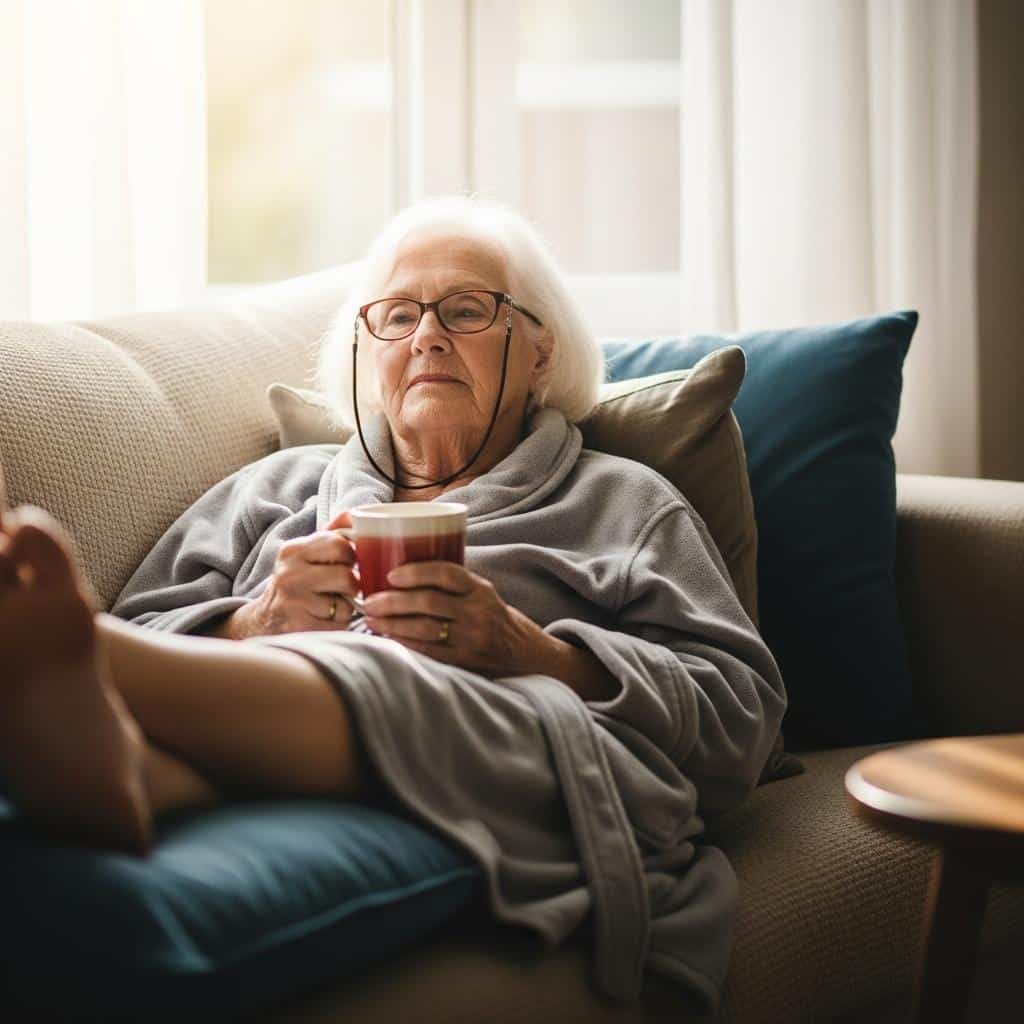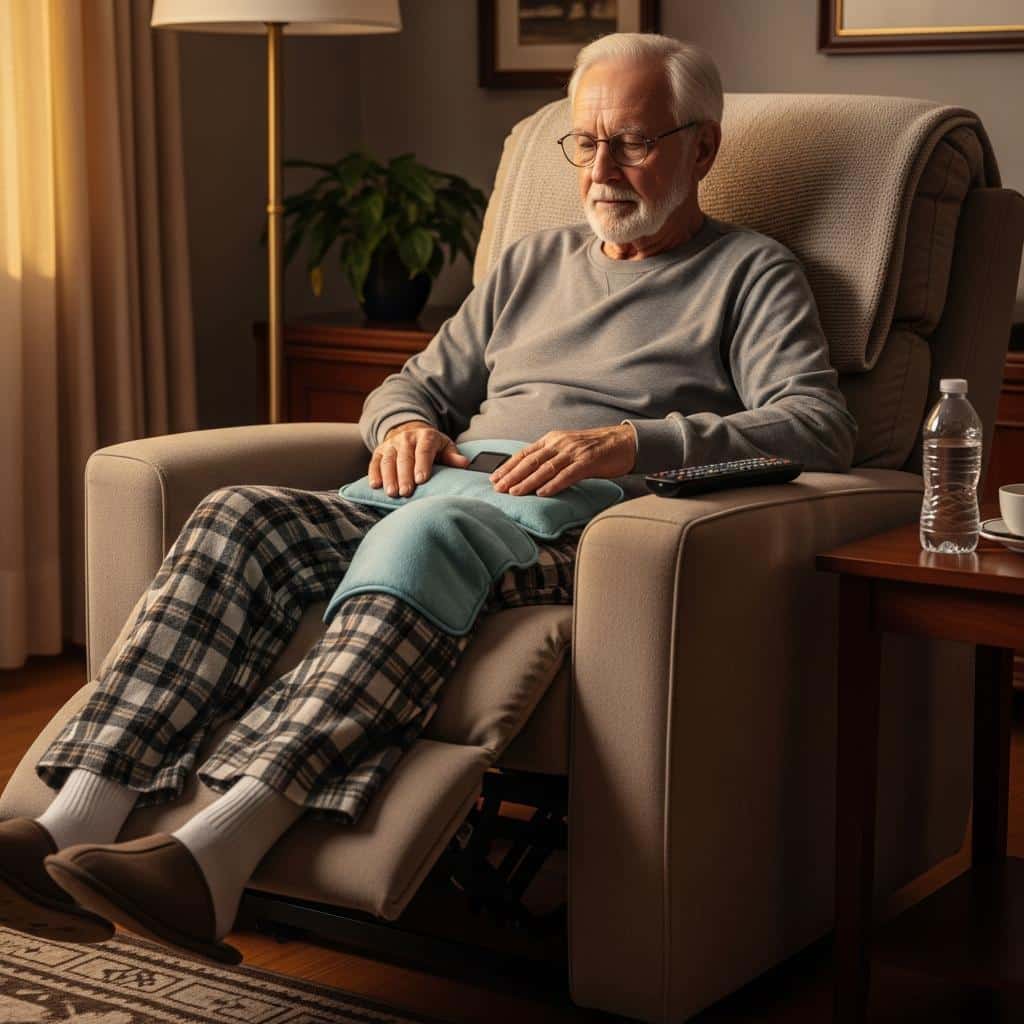It’s Friday after Thanksgiving. The house is finally quiet. The dishes are done, the leftovers are tucked away, and everyone has gone home. And you? You’re completely, utterly exhausted.
Maybe you’re telling yourself you should feel better by now. Maybe you’re wondering why you’re still so tired when the holiday was two days ago.
Here’s what you need to know: this exhaustion isn’t in your head, and it’s not weakness. Your body worked incredibly hard, and it needs time to recover.
Many senior hosts push through this depletion, telling themselves they’ll rest “when things settle down.” But here’s the problem: pushing through often leads to getting sick within the week, experiencing a fall, or feeling drained for the entire holiday season ahead.
There’s a better way.
A structured 3-day recovery plan that honors what your body actually needs—not what you think you “should” be able to handle. This isn’t about being lazy. It’s about being strategic so you can actually enjoy the rest of the season.

Why Your Body Needs Dedicated Recovery Time (It’s Not Just About Being Tired)
Let’s talk about what really happens to your body during holiday hosting.
Your energy stores are legitimately depleted. As we age, our bodies don’t replenish energy the way they did when we were younger. The marathon of preparation, cooking, hosting, and cleanup creates a genuine energy deficit that takes time to restore.
Inflammation is real. Hours of standing in the kitchen, reaching into cabinets, bending to check the oven, carrying serving dishes—all of this triggers inflammatory responses in your joints and muscles. For older adults, this inflammation takes longer to calm down.
Your sleep has been disrupted. The excitement leading up to the holiday, the change in routine, and the mental energy of orchestrating everything affects your sleep quality for days. Even if you slept on Thanksgiving night, you’re likely carrying sleep debt from the days before.
Stress hormones are still elevated. Even joyful events flood your system with cortisol. Your body has been operating in “high alert” mode, and that stress response doesn’t just switch off when the last guest leaves.
Your immune system is vulnerable. Exhaustion combined with exposure to multiple people creates the perfect conditions for getting sick in the days following a holiday gathering.
Here’s what many people don’t realize: it’s not just Thanksgiving Day that exhausted you. It’s the days of shopping and prep beforehand, the event itself, AND the cleanup afterward. Your body has been running a marathon, and the adrenaline that carried you through is now gone, revealing just how depleted you truly are.
What happens if you don’t rest? You’re at higher risk for falls because fatigue affects balance. Your weakened immune system makes illness more likely. Chronic conditions like arthritis may flare up. Blood pressure can spike. And ironically, pushing through actually extends your recovery time—you’ll feel tired longer. For more on protecting yourself from falls, especially during vulnerable times, explore our guide to fall safety strategies.
This isn’t about aging poorly or losing your edge. This is basic human physiology. Your body worked hard and deserves intentional recovery. Respecting that need is wisdom, not surrender.

The 3-Day Recovery Framework: What to Expect
Here’s why three days matters.
Day 1 (typically Friday): Immediate physical recovery. Your body needs deep rest to begin restoration.
Day 2 (typically Saturday): Gentle reactivation. Light movement and gradual re-engagement with your normal routine.
Day 3 (typically Sunday): Preparation and reset. Easing back into regular activities and setting yourself up for the week ahead.
The science backs this up: most acute exhaustion effects resolve within 72 hours when you give your body proper rest and support.
This isn’t about lying in bed for three straight days (unless that’s what you need!). It’s about strategically supporting your body’s natural recovery process with the right activities at the right time.
What this is NOT: This plan isn’t about becoming an invalid or giving up on life for three days. It’s not suggesting you cancel every obligation or stop moving entirely.
What this IS: A strategic approach to preventing illness and injury. Permission to prioritize recovery without guilt. A framework you can adapt to your specific needs and circumstances.
Think of it as recovery training—just as important as the hosting event itself.

Day 1: Immediate Physical Recovery (Give Your Body What It Desperately Needs)
Friday after hosting is about one thing: letting your body begin physical restoration without making new demands on it.
Rest and Sleep Come First
Give yourself permission to sleep late or take a nap. Your body needs sleep to repair tissues, consolidate memories, and restore energy. This isn’t indulgence—it’s biological necessity.
Stay in comfortable clothes all day. There’s no prize for “getting dressed” today.
Minimize physical demands. Nothing that requires sustained standing, repeated bending, or lifting. If it can wait until tomorrow, let it wait.
Elevate your feet periodically. This reduces any swelling from yesterday’s extended time on your feet.
Hydration and Gentle Nutrition
Drink plenty of water throughout the day. You’re likely more dehydrated than you realize after the busy day before.
Keep meals easy and light. Your digestive system is also recovering—don’t stress it with heavy or complicated meals.
Use those leftovers strategically. Pre-made food means no cooking required, which is exactly what you need today.
Avoid alcohol. Your body doesn’t need additional detox work right now.
Managing Pain and Inflammation
Use ice or heat for sore joints. Address any pain from yesterday’s physical activity promptly.
Do gentle stretching if something feels tight. Nothing vigorous—just easy, comfortable movements.
Take your regular medications on schedule. Don’t skip them because you’re resting. If joint pain is making it hard to sleep comfortably, you might find helpful tips in our guide to managing arthritis pain for better rest.
Monitor for concerning symptoms like unusual pain, significant dizziness, or shortness of breath. Trust your instincts if something feels wrong.
What Day 1 Actually Looks Like
Here’s a realistic picture: You sleep late or allow yourself extended rest in bed. Breakfast comes from leftovers or the simplest option possible. The morning is spent on the couch with your feet up—reading, watching something light, or simply resting. You focus on drinking water throughout the day.
Lunch is simple, again relying on leftovers. An afternoon nap happens if your body needs it—even 20-30 minutes helps significantly. Dinner requires minimal prep. You turn in early.
Setting Social Boundaries
It’s okay to skip Black Friday activities. You don’t have to participate in shopping or outings just because everyone else is.
Decline visitors. You can say: “I’m taking a recovery day after hosting. Let’s connect next week!”
Limit phone calls. Even social interaction requires energy you don’t have to spare today.
Keep commitments to absolute essentials only. Everything else can wait.
Ready to discover more strategies for healthy, comfortable aging? Subscribe to our newsletter for expert-tested tips designed specifically for older adults.
What to Say When People Don’t Understand
Some people won’t get why you need a rest day. Here’s what to tell them:
✅ “I always take a rest day after hosting. It helps me enjoy the rest of the season.”
✅ “My body needs recovery time after all that activity. I’ll be ready to go next week!”
✅ “I’ve learned that if I don’t rest now, I end up sick later. So I’m being proactive.”
Warning Signs That Need Medical Attention
Most post-hosting exhaustion is completely normal. However, contact your doctor immediately if you experience chest pain or pressure, severe shortness of breath, extreme dizziness or confusion, falls or near-falls, or severe pain that’s new or unusual.
For adult children watching their parents: Pay attention if your parent seems “off” in ways beyond normal tiredness. Trust your observations and encourage medical evaluation if concerned. If multiple family members are checking on an aging parent after they’ve hosted, our guide to coordinating family care can help everyone stay on the same page.

Day 2: Gentle Reactivation (Getting Your Body Moving Again)
Saturday is about beginning to move again without overdoing it. You’re also gradually reconnecting socially in low-stress ways.
Physical Reactivation Done Right
Take a morning walk. Just 10-15 minutes of easy walking. Fresh air helps reset your system and signals to your body that it’s time to start moving again.
Light stretching routine. Focus on areas that feel tight or sore. Nothing intense—just gentle movements that feel good.
Basic activities only. Simple household tasks that get you moving are fine—watering plants, light tidying. But this is NOT the day for deep cleaning or reorganizing closets.
Listen to your body. If you’re still exhausted, scale back. There’s no prize for pushing through. Better to extend Day 1 activities than to overdo it on Day 2.
Energy-Building Activities
Shower and get dressed. The simple act of “getting ready” helps signal to your brain that you’re in recovery mode, not sick mode.
Open windows and get fresh air. An environmental refresh supports mental recovery.
Light meal prep if you feel up to it. Perhaps make a simple soup from leftovers—gentle activity with a warm, nourishing result. But only if it sounds pleasant, not like another chore.
Social and Mental Recovery
Low-key social engagement is good. Phone calls with friends or family provide connection without physical demands. Keep them positive and light.
Short visits work if you want them. 30-60 minutes maximum, and preferably in YOUR space so you can end it when needed.
Digital connection counts. Video calls, texting, or browsing social media can provide the social interaction you might be craving without the energy drain of in-person visits. If family lives far away and you’re looking for easier ways to stay in touch, our article on maintaining connections from a distance offers helpful technology options.
Enjoyable, low-demand activities. Reading, puzzles, or light hobbies help restore your mental energy.
Avoid stressful tasks. Don’t tackle bills, difficult emails, or complex planning today. Your mental bandwidth is still rebuilding.
Gratitude reflection. Spending a few minutes thinking about the positive moments from the holiday helps shift your mindset and provides emotional restoration.
What Day 2 Actually Looks Like
You wake at your normal time, but don’t set an alarm if you don’t have to. Morning routine includes that short walk afterward. You tackle one small housekeeping task—maybe tidying the living room or starting a load of laundry. Not multiple projects, just one.
Lunch is easy. You have either a short visit with a friend OR a phone call with family—not both, and not multiple social interactions. The afternoon includes an enjoyable, restful activity of your choosing. Dinner remains simple. Evening is for relaxation. Regular bedtime.
Adjusting for Obligations
If you absolutely must do something on Day 2, sandwich it between rest periods. Set strict time limits: “I can do this for one hour, then I need to rest.” Build in breaks, even brief ones, during necessary activities.
What Success Looks Like on Day 2
By the end of Saturday, you should have slightly more energy than Friday. You’ve moved your body without exhausting it. You’ve had some social connection without overstimulation. And importantly, you still feel like you’re recovering—not “back to normal” yet. That’s Day 3’s goal.

Day 3: Preparation and Reset (Returning to Your Normal Routine)
Sunday is about returning to regular activities while maintaining the recovery gains you’ve made. You’re also setting yourself up for a successful week ahead.
Re-establishing Your Routine
Return to your regular wake time. Back to your typical morning schedule, not the extended rest of Day 1 or the flexible timing of Day 2.
Complete your normal morning routine. Full morning activities, not the abbreviated version from the past two days.
Regular meal times. Re-establish your usual eating patterns.
Standard activity level. Resume your typical daily activities—whatever “normal” looks like for you.
Preparation for the Week Ahead
Light meal prep. Set yourself up for easy meals early in the week. This doesn’t mean cooking elaborate dishes—just ensuring you have simple, nutritious options ready.
Check your calendar. Review upcoming commitments and make sure nothing overwhelming is scheduled for the first few days of the week.
Organize medications. Make sure pill organizers are filled and ready for the week.
Light grocery shopping IF needed and IF you feel up to it. Otherwise, order for delivery. Don’t make this a major excursion.
Physical Check-In
Take a moment to assess: Are you back to your baseline energy level? Still a bit tired? Experiencing concerning exhaustion?
Note any lingering pain. Is anything still bothering you that might need attention from your doctor?
Evaluate the recovery plan’s effectiveness. Did this three-day approach help? What would you adjust next time?
What Day 3 Actually Looks Like
Normal morning routine and timing. One or two light household tasks or errands—not a full day of productivity. Preparation activities that make the upcoming week easier. Social activities at your normal level, whether that’s attending religious services or your usual Sunday plans. Regular evening routine. Standard bedtime.
The Re-Entry Principle
By the end of Day 3, you should feel mostly restored. If you don’t, that’s important information. It might mean you need to adjust your hosting approach for future holidays, or it could be worth discussing your energy levels with your doctor.
Making Recovery Part of Your Future Hosting Strategy
Here’s the thing: recovery shouldn’t be an afterthought. It should be built into your hosting plan from the beginning.
Plan recovery WHILE planning the event. When you commit to hosting Thanksgiving, simultaneously block off the following Friday through Sunday for recovery. It’s all one event, not separate things.
Communicate recovery time to family in advance. Set clear expectations: “I’ll be recovering after hosting, so let’s plan to connect the following week.”
Refuse commitments during your recovery period. “I’m not available that weekend—I’ll be recovering from hosting” is a complete sentence that requires no justification.
Scale hosting to allow for recovery. If you can’t afford three days of recovery afterward, the event might be too demanding. That’s valuable information for future planning.
Modifications That Reduce Recovery Needs
Accepting more help during the event means less exhaustion and faster recovery. Shortening the event duration—four hours instead of eight—significantly reduces physical demands. Simplifying the menu means less time cooking and standing. Professional cleanup help eliminates post-event work.
The Sustainability Question
If you can’t recover within three days, or if recovery is getting harder year after year, it might be time to adjust your hosting approach. That’s not failure—that’s wisdom and adaptation.
Track how you feel after each holiday hosting event. Notice patterns: What makes recovery easier? What makes it harder? Adjust your approach based on what you learn. Share this wisdom with other hosts in your life.
If you’re looking for ways to connect with family that require less energy, our guide to cozy fall activities for grandparents offers low-effort options that still create meaningful memories.

![Elderly woman resting couch morning light[1]](https://www.grayingwithgrace.com/wp-content/uploads/2025/11/elderly_woman_resting_couch_morning_light1-e1762874558330.jpg)
![Senior woman bedroom window breakfast journaling[1]](https://www.grayingwithgrace.com/wp-content/uploads/2025/12/senior_woman_bedroom_window_breakfast_journaling1-e1767122246503-450x300.jpg)
![Senior couple cold porcht thermal mugs[1]](https://www.grayingwithgrace.com/wp-content/uploads/2025/12/senior_couple_cold_porcht_thermal_mugs1-e1767121617380-450x300.jpg)
![Senior woman video call weekly checkin[1]](https://www.grayingwithgrace.com/wp-content/uploads/2025/12/senior_woman_video_call_weekly_checkin1-e1767120242595-450x300.jpg)
![Senior woman window coffee cozy[1]](https://www.grayingwithgrace.com/wp-content/uploads/2025/12/senior_woman_window_coffee_cozy1-e1767119963869-450x300.jpg)
![Older group herbal tea infusion winter social[1]](https://www.grayingwithgrace.com/wp-content/uploads/2025/12/older_group_herbal_tea_infusion_winter_social1-e1767119761234-450x300.jpg)
![Senior woman step stool safe closet declutter[1]](https://www.grayingwithgrace.com/wp-content/uploads/2025/12/senior_woman_step_stool_safe_closet_declutter1-e1767118700445-450x300.jpg)
![Older couple reviewing bills together[1]](https://www.grayingwithgrace.com/wp-content/uploads/2025/12/older_couple_reviewing_bills_together1-e1767118045107-450x300.jpg)
![Elderly couple garden bench rest[1]](https://www.grayingwithgrace.com/wp-content/uploads/2025/12/elderly_couple_garden_bench_rest1-e1767102641150-450x300.jpg)



